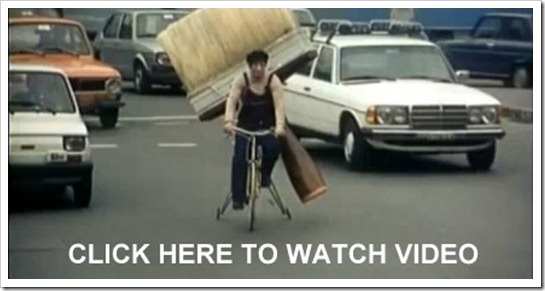A Big Brush … or a Great Brush? Posted by Serena on Mar 24, 2014 in Grammar
Getting adjectives in the correct position in Italian is very important because in certain cases it can completely change the meaning of the sentence. A great example of this is the classic television advert for Boldrini’s Cinghiale paint brushes.
Vigile: “Ma cosa fa con quell’arnese? Ostacola il traffico!” Imbianchino: "Devo dipingere una parete grande e ci vuole un pennello grande". Vigile: "Non ci vuole un pennello grande, ma un grande pennello: Cinghiale".
Traffic Policeman: “What are you doing with that contraption? You’re blocking the traffic!” Decorator: “I’ve got to paint a big wall and I need a big brush”. Traffic Policeman: “You don’t need a big brush, you need a great brush: Cinghiale”.
As you can see from this example, by simply moving the position of the adjective grande, it takes on a different meaning. In the first instance: grande means ‘big’. However, when we put grande before pennello it takes on the meaning of ‘great’ as in ‘very good quality’. So, to clarify: pennello grande = big brush; grande pennello = very good quality brush.
Now let’s look at some common examples of adjectives that change their meaning depending on their position in relation to the noun:
the adjectives grande/i (big), buono/a/i/e (good), and povero/a/i/e (poor) have a literal meaning when they follow the noun:
È una donna grande = She is a big woman
È un uomo buono = He is a good man
È una donna povera = She is a poor woman (i.e. without money)
However when these same adjectives precede the noun they take on a more metaphoric meaning:
È una gran donna = She is a great woman (N.B. we drop the ‘-de’ from grande for pronunciation reasons)
È un buon uomo = He is a naive man
È una povera donna = She is an unfortunate woman
Here are a few more adjectives that change meaning according to their position:
Certo/a/i/e: e.g. certe notizie sono sconvolgenti = certain pieces of news are upsetting, but non ci sono ancora notizie certe sull’incidente = there’s still no definite news about the accident
Diverso/a/i/e: e.g il clima è influenzato da diversi fattori = the weather is influenced by several factors, but il clima è influenzato da fattori diversi = the weather is influenced by different factors
Numeroso/a/i/e: e.g. numerose famiglie sono rimaste senza elettricità = many families have been left without electricity, but le famiglie numerose erano più comuni nel passato = big families were more common in the past
Semplice/i: e.g. è una semplice operazione = it’s just an operation, but è un’operazione semplice = it’s an easy operation
Unico/a/i/che: e.g. ho un’unica foto del mio bisnonno materno = I’ve only got one photo of my maternal great grandfather, but questa è una foto unica del mio bisnonno materno = this is a unique photo of my maternal great grandfather
Vecchio/a/i/e: e.g. Maria è una mia vecchia amica d’infanzia = Maria is an old friend from my childhood, but Maria è un’amica vecchia = Maria is an elderly friend

Build vocabulary, practice pronunciation, and more with Transparent Language Online. Available anytime, anywhere, on any device.





Comments:
Laurel:
Excellent lesson, thanks!
Could you elaborate on this phrase, please? “È un buon uomo = He is a naive man.” Seems like an odd translation.
Geoff:
@Laurel Salve Laurel, in che senso è ‘he is a naive man’ una strana traduzione, non ho capito? Come lo tradurresti tu?
A presto, Geoff